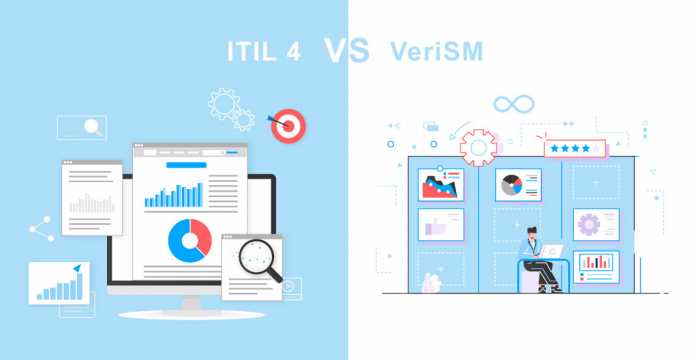
While ITIL has remained approximately for several years and is known as one of the best (ITSM) IT service management best practices platforms. VeriSM founded in 2018 is trying to fit into the sector in a gradual manner. And recently, AXELOS released ITIL 4 in early 2019 to accommodate the upcoming trends in the IT Services industry along with the Fourth Industrial Revolution.
The creation of the VeriSM framework incorporated some new service management techniques, like Agile including shift-left, amongst many others. These new ideas have coincided with the major revision of ITIL in ITIL 4.
In this article on ‘VeriSM vs ITIL 4’, we can discuss how, by looking through their basic ideas, these 2 service management methods are either distinct or identical. Let’s start with some basic info.
VeriSM Principles
VeriSM is an organizational-level method of service delivery that aims to the end-to-end perspective rather than towards a specific agency.
They are centered on the VeriSM model, which tells companies how they would flexibly follow a variety of marketing strategies to provide the right product or service to their customers at the right time.
Based on the kind of business you are in, the scale of the enterprise, the business goals, the corporate culture, and also the essence of the particular project or program you are operating on, VeriSM allows for a customized strategy.
VeriSM allows companies to adapt to their clients and generate value through comprehensive service delivery methods, rather than relying on one normative way of operating.
Governance overlooks any operation in the VeriSM strategy, maintaining a firm emphasis on the meaning, objectives, and priorities of the enterprise. The values of service management are then established for the organization. This ensures that all goods and services are delivered according to the organization’s needs.
Principles are established for areas like defense, risk, efficiency, and asset use, and then conveyed to all personnel engaged in product and service creation and activity.
Management mesh is the unique feature of the VeriSM model. This offers a modular solution that can be tailored for a specific product or service, based on the specifications.
The mesh incorporates:
- Environment
- Resources
- Management practices
- Emerging technologies
These aspects are known for each product or service, and the mesh is flexible where appropriate.
The ITIL 4 Principles
The most common and internationally used framework for IT Service Management is ITIL ® (Information Technology Infrastructure Library). Since the very first edition in the late ’80s, it has undergone many improvements over time to the early 2000s iteration, known as ITIL v2. Later, the term commonly used for the 2007 upgrade was ITIL v3, which can be referred to more accurately as ITIL 2007. ITIL’s subsequent edition was released in 2011 and is also recognized as ITIL 2011. Now, there will be a new edition of ITIL available: ITIL 4.
ITIL ® 4 was developed to help companies satisfy the rising demand from the dynamic new world of the moment. Modern and more streamlined ITIL 4 modules will replace the older ITIL v3 modules majorly in ITIL Intermediate Lifecycle Modules, ITIL Intermediate Capability Modules, and ITIL MALC.
VeriSM vs ITIL 4: Differences
Within ITIL 4, SVS stands for Service Value System. SVS helps enterprises to achieve value through the services provided. The SVS covers the following parts:
- Governance
- Guiding principles
- SVC
- Practices
- Continual improvement
The VeriSM illustration is a service management working basis for a company, that involves:
- Service management principles
- Governance
- The Management Mesh
Furthermore, the stages Define, Produce, Provide, and Respond.
So, because of its tradition, we notice that ITIL 4 works a little further in technical words. Still, VeriSM holds a deeper understanding of the notion at a horizontal level, allowing the company to determine the extensive vertical technological methods.
Compared Concepts
The principles at ITIL are general guidelines for how a company should acquire importance. The Service Management Concepts in VeriSM are more precise and restricted. Thus the two structures describe separate concepts.
Operational Standards Compared
The two methods’ organizational models have principles in general though also a distinct methodology. ITIL 4 owns 6 operations, and VeriSM 4.
For a much more comprehensive approach, the four behaviors may be defined as classes in VeriSM. ITIL 4 often integrates its six operations with the thirty-four actions as strings.
The value chain of the ITIL 4 sector is an organizational design for the development, distribution, and continuous enhancement of services. It describes the main activities needed to generate value in reply to demand, via product and service development and distribution.
Governance Associated
The definition of ITIL 4 is: “Governance is the mechanism by which an entity is guided and regulated.” VeriSM has a somewhat similar description: “Governance is the fundamental framework for managing and regulating an organization’s operations.”
Comparing Activities
ITIL 4 and VeriSM activities have a specific connotation to them. In ITIL 4 a practice is a collection of organizational tools planned to achieve a job or a goal. Although the emphasis in earlier iterations of ITIL was on procedures, ITIL 4 changed to a focus on activities. With 34 methods vs ITIL v3 ‘s 26 operations.
Conclusion
In conclusion, VeriSM and ITIL 4 certainly have some parallels and variations. The important point to recognize is that besides the classical IT concepts of systems, operations, technology, and resources, all approaches rely on individuals, industry, and the importance of the services.
For enterprises looking to achieve overall transformation in the ITSM capabilities, it is important for individuals and team members to get trained in the latest ITSM Certification Courses. There are many accredited training organizations that help businesses with customized onsite training for ITIL 4 and VeriSM courses that is relevant to their business needs. I hope you found this article on ‘VeriSM vs ITIL 4’ interesting and informative.
Some of the popular ITSM courses that individuals and enterprise team members can take up are:
















